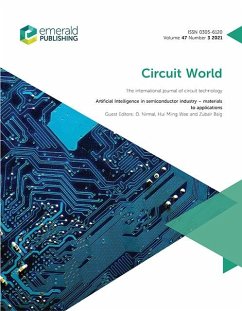
Rad-hard Semiconductor Memories (eBook, PDF)
Versandkostenfrei!
Sofort per Download lieferbar
94,95 €
inkl. MwSt.
Weitere Ausgaben:

PAYBACK Punkte
47 °P sammeln!
Rad-hard Semiconductor Memories is intended for researchers and professionals interested in: understanding how to design and make a preliminary evaluation of rad-hard semiconductor memories; making leverage on standard CMOS manufacturing processes available from different silicon foundries; and using different technology nodes. In the first part of the book, a preliminary overview of the effects of radiation in space, with a specific focus on memories, will be conducted to enable the reader to understand why specific design solutions are adopted to mitigate hard and soft errors. The second par...
Rad-hard Semiconductor Memories is intended for researchers and professionals interested in: understanding how to design and make a preliminary evaluation of rad-hard semiconductor memories; making leverage on standard CMOS manufacturing processes available from different silicon foundries; and using different technology nodes. In the first part of the book, a preliminary overview of the effects of radiation in space, with a specific focus on memories, will be conducted to enable the reader to understand why specific design solutions are adopted to mitigate hard and soft errors. The second part will be devoted to RHBD (Radiation Hardening by Design) techniques for semiconductor components with a specific focus on memories. The approach will follow a top-down scheme starting from RHBD at architectural level (how to build a rad-hard floor-plan), at circuit level (how to mitigate radiation effects by handling transistors in the proper way) and at layout level (how to shape a layout to mitigate radiation effects). After the description of the mitigation techniques, the book enters in the core of the topic covering SRAMs (synchronous, asynchronous, single port and dual port) and PROMs (based on AntiFuse OTP technologies), describing how to design a rad-hard flash memory and fostering RHBD toward emerging memories like ReRAM. The last part will be a leap into emerging memories at a very early stage, not yet ready for industrial use in silicon but candidates to become an option for the next wave of rad-hard components. Technical topics discussed in the book include:- Radiation effects on semiconductor components (TID, SEE)- Radiation Hardening by Design (RHBD) Techniques- Rad-hard SRAMs- Rad-hard PROMs- Rad-hard Flash NVMs- Rad-hard ReRAMs- Rad-hard emerging technologies
Dieser Download kann aus rechtlichen Gründen nur mit Rechnungsadresse in A, B, BG, CY, CZ, D, DK, EW, E, FIN, F, GR, HR, H, IRL, I, LT, L, LR, M, NL, PL, P, R, S, SLO, SK ausgeliefert werden.













